上海外国语大学英语翻硕考研备考-译文赏析
上海外国语大学翻译专业研究生历年真题
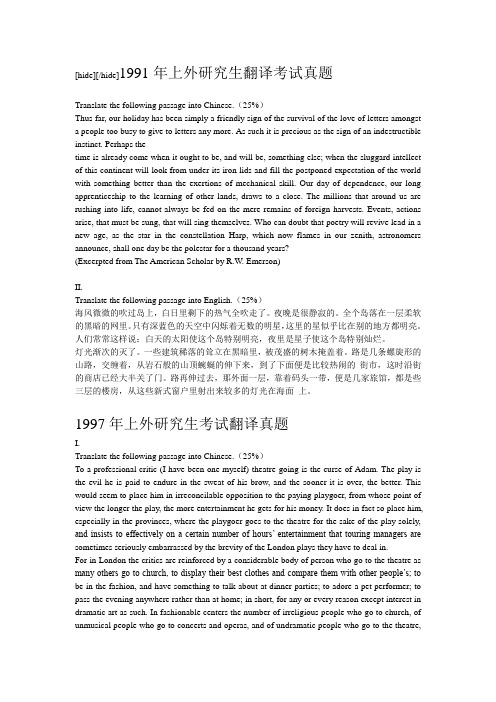
[hide][/hide]1991年上外研究生翻译考试真题Translate the following passage into Chinese.(25%)Thus far, our holiday has been simply a friendly sign of the survival of the love of letters amongst a people too busy to give to letters any more. As such it is precious as the sign of an indestructible instinct. Perhaps thetime is already come when it ought to be, and will be, something else; when the sluggard intellect of this continent will look from under its iron lids and fill the postponed expectation of the world with something better than the exertions of mechanical skill. Our day of dependence, our long apprenticeship to the learning of other lands, draws to a close. The millions that around us are rushing into life, cannot always be fed on the mere remains of foreign harvests. Events, actions arise, that must be sung, that will sing themselves. Who can doubt that poetry will revive lead in a new age, as the star in the constellation Harp, which now flames in our zenith, astronomers announce, shall one day be the polestar for a thousand years?(Excerpted from The American Scholar by R.W. Emerson)II.Translate the following passage into English.(25%)海风微微的吹过岛上,白日里剩下的热气全吹走了。
上海外国语大学英语翻硕考研备考-译文赏析
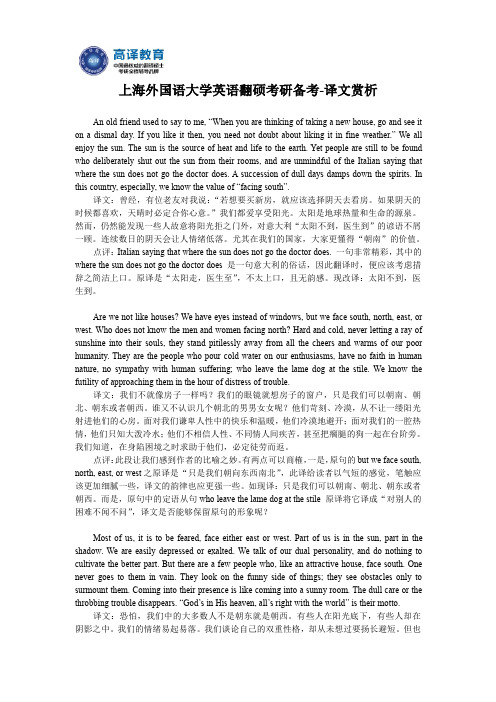
上海外国语大学英语翻硕考研备考-译文赏析An old friend used to say to me,“When you are thinking of taking a new house,go and see it on a dismal day.If you like it then,you need not doubt about liking it in fine weather.”We all enjoy the sun.The sun is the source of heat and life to the earth.Yet people are still to be found who deliberately shut out the sun from their rooms,and are unmindful of the Italian saying that where the sun does not go the doctor does.A succession of dull days damps down the spirits.In this country,especially,we know the value of“facing south”.译文:曾经,有位老友对我说:“若想要买新房,就应该选择阴天去看房。
如果阴天的时候都喜欢,天晴时必定合你心意。
”我们都爱享受阳光。
太阳是地球热量和生命的源泉。
然而,仍然能发现一些人故意将阳光拒之门外,对意大利“太阳不到,医生到”的谚语不屑一顾。
连续数日的阴天会让人情绪低落。
尤其在我们的国家,大家更懂得“朝南”的价值。
点评:Italian saying that where the sun does not go the doctor does.一句非常精彩,其中的where the sun does not go the doctor does是一句意大利的俗话,因此翻译时,便应该考虑措辞之简洁上口。
上海外国语大学英语翻硕考研备考-十大翻译技巧之一

上海外国语大学英语翻硕考研备考-十大翻译技巧之一翻译是文化交际的桥梁。
不同的国家、民族之间不同文化的交流和渗透,都离不开翻译活动。
翻译活动不仅是一种语言活动,更是一种思维活动。
不同民族由于历史、生态、宗教、民情、习俗的不同。
对于同一思维对象或内容的思维角度就不尽一致,从而在语言上采用不同的表达形式。
因此不同民族在语言表达上存在着明显的差异。
英汉句子结构的差异和表达习惯的不同反映了东西方两个民族思维方式和文化心理结构的不同。
因此,在翻译过程中,必须按照译入语民族思维方式的特点,调整语句结构,以符合译入语的表达习惯来表达。
一、调整句子结构东西方民族各有各的思维形式,西方民族的思维形式是重在分析,这种思维形式使西方人惯于“由一列多”的思维,句子结构以主语和谓语为核心,统摄各种短语和从句,由主列次、递相迭加、结构复杂,但形散而意合,形成了“树杈形”的句式结构,而东方民族思维形式是重在综合,这种思维形式使中国人注重整体和和谐,强调“从多而一”的思维形式,句子结构以动词为中心,以时间顺序为语序链,形成“流水型”的句式结构。
我国学者吕叔湘先生曾对汉语句子结构作过分析,他指出:“汉语里持多流水句,一个子句接一个子句,很多地方可断可连,汉语的这种流水句式,用节节短句逐点交待,把问题层层展开,这使得在表达相同内容上,汉语句子在数量上往往多于英汉句子,因此翻译时,汉语的几个短句往往可以译成一个由英语关联词及各种短语联接在一起的一个英语长句。
如:(1)近读华君武一幅题为“谨防”的漫画,画面上两个人骑着装满良心的三轮车,车上插着“收购良心”、“方式价格面议”的广告牌。
A couple of days ago,I came across a piece of Hua’s caricature with a title“be cautious”on which two men are riding a tricycle with a fall load of“conscious”and aboard which says “Purchase conscience,for particulars,negotiate face to face”.(2)眼下,咱只盼着有关部门对“工薪族”们作一个详细的调查,对我们的收入心里有个数,别出来个咱累死也够不着的房价。
上海外国语大学考研英语语言文学英汉互译备考练习
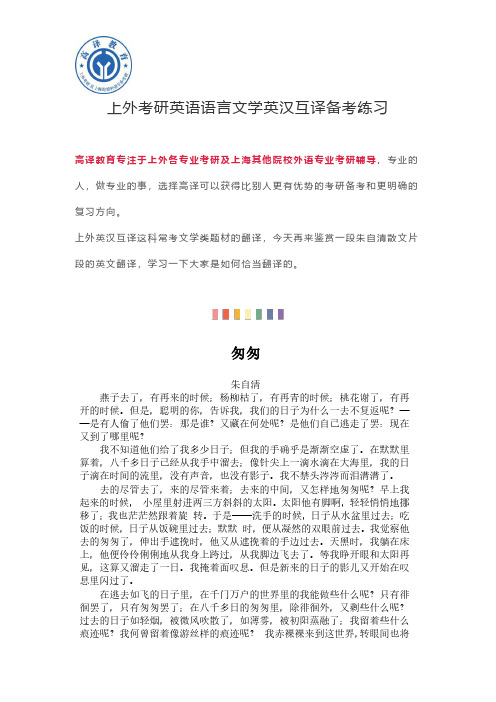
上外考研英语语言文学英汉互译备考练习高译教育专注于上外各专业考研及上海其他院校外语专业考研辅导,专业的人,做专业的事,选择高译可以获得比别人更有优势的考研备考和更明确的复习方向。
上外英汉互译这科常考文学类题材的翻译,今天再来鉴赏一段朱自清散文片段的英文翻译,学习一下大家是如何恰当翻译的。
匆匆朱自清燕子去了,有再来的时候;杨柳枯了,有再青的时候;桃花谢了,有再开的时候。
但是,聪明的你,告诉我,我们的日子为什么一去不复返呢?——是有人偷了他们罢:那是谁?又藏在何处呢?是他们自己逃走了罢:现在又到了哪里呢?我不知道他们给了我多少日子;但我的手确乎是渐渐空虚了。
在默默里算着,八千多日子已经从我手中溜去;像针尖上一滴水滴在大海里,我的日子滴在时间的流里,没有声音,也没有影子。
我不禁头涔涔而泪潸潸了。
去的尽管去了,来的尽管来着;去来的中间,又怎样地匆匆呢?早上我起来的时候,小屋里射进两三方斜斜的太阳。
太阳他有脚啊,轻轻悄悄地挪移了;我也茫茫然跟着旋转。
于是——洗手的时候,日子从水盆里过去;吃饭的时候,日子从饭碗里过去;默默时,便从凝然的双眼前过去。
我觉察他去的匆匆了,伸出手遮挽时,他又从遮挽着的手边过去。
天黑时,我躺在床上,他便伶伶俐俐地从我身上跨过,从我脚边飞去了。
等我睁开眼和太阳再见,这算又溜走了一日。
我掩着面叹息。
但是新来的日子的影儿又开始在叹息里闪过了。
在逃去如飞的日子里,在千门万户的世界里的我能做些什么呢?只有徘徊罢了,只有匆匆罢了;在八千多日的匆匆里,除徘徊外,又剩些什么呢?过去的日子如轻烟,被微风吹散了,如薄雾,被初阳蒸融了;我留着些什么痕迹呢?我何曾留着像游丝样的痕迹呢?我赤裸裸来到这世界,转眼间也将赤裸裸地回去罢?但不能平的,为什么偏要白白走这一遭啊?你聪明的,告诉我,我们的日子为什么一去不复返呢?Transient Days(张培基版)If swallows go away,they will come back again.If willows wither,they will turn green again.If peach blossoms fade,they will flower again.But,tell me,you the wise,why should our days go by never to return?Perhaps they have been stolen by someone.But who could it be and where could he hide them?Perhaps they have just run away by themselves.But where could they be at the present moment?I don't know how many days I am entitled to altogether,but my quota of them is undoubtedly wearing away.Counting up silently,I find that more than 8,000days have already slipped away through my fingers.Like a drop of water falling off a needle point into the ocean,my days are quietly dripping into the stream of time without leaving a trace.At the thought of this,sweat oozes from my forehead and tears trickle down my cheeks.What is gone is gone,what is to come keeps coming.How swift is the transition in between!When I get up in the morning,the slanting sun casts two or three squarish patches of light into my small room.The sun has feet too,edging away softly and stealthily.And,without knowing it,I am already caught in its revolution.Thus the day flows away through the sink when I wash my hands; vanishes in the rice bowl when I have my meal;passes away quietly before the fixed gaze of my eyes when I am lost in reverie.Aware of its fleeting presence,I reach out for it only to find it brushing past my out-stretched hands.In the evening, when I lie on my bed,it nimbly strides over my body and flits past my feet.By the time when I open my eyes to meet the sun again,another day is already gone.I heave a sign,my head buried in my hands.But,in the midst of my sighs,a new day is flashing past.Living in this world with its fleeting days and teeming millions,what can I do but waver and wander and live a transient life?What have I been doing during the 8,000fleeting days except wavering and wandering?The bygone days,like wisps of smoke,have been dispersed by gentle winds,and,like thin mists,have been evaporated by the rising sun.What traces have I left behind?No,nothing,not even gossamer-like traces.I have come to this world stark naked,and in the twinkling of an eye,I am to go to back as stark naked as ever.However,I am taking it very much to heart:why should I be made to pass through this world for nothing at all?O you the wise,would you tell me please:why should our days go by never to return?Rush(朱纯深版)Swallows may have gone,but there is a time ofreturn;willow trees may have died back,but there isa time of regreening;peach blossoms may havefallen,but they will bloom again.Now,yo u the wise,tell me,why should our days leave us, never toreturn?-If they had been stolen by som eone,whocould it be?Where could he hide them?If they had made the escape themselves,then wherecould they stay at the moment?I don't know how many days I have been given to spend,but I do feel my hands are gettinge mpty.Taking stock silently,I find that more than eight thousand days have already slid awayfrom me.Like a drop of water from the point of a needle disappearing into the ocean,my daysare drip ping into the stream of time, soundless,traceless.Already sweat is starting on myforehead,and te ars welling up in my eyes.Those that have gone have gone for good,those to come keep coming;yet in between,hows wift is the shift,in such a rush?When I get up in the morning,the slanting sun marks itspresence in my small room in two or three oblongs.The sun has feet,look,he is treading on,lightly and fu rtively;and I am caught,blankly,in his revolution.Thus--the day flows awaythrough the sink wh en I wash my hands, wears off in the bowl when I eat my meal,andpasses away before my day-dr eaming gaze as reflect in silence.I can feel his haste now,so Ireach out my hands to hold him bac k,but he keeps flowing past my withholding hands.In theevening, as I lie in bed,he strides over my body,glides past my feet,in his agile way. Themoment I open my eyes and meet the sun agai n,one whole day has gone.I bury my face inmy hands and heave a sigh.But the new day begins t o flash past in the sigh.What can I do,in this bustling world,with my days flying in their escape? Nothing but tohes itate,to rush.What have I been doing in that eight-thousand-day rush,apart fromhesitating?Thos e bygone days have been dispersed as smoke by a light wind,or evaporatedas mist by the mornin g sun. What traces have I left behind me?Have I ever left behind anygossamer traces at all?I hav e come to the world,stark naked;am I to go back,in a blink,inthe same stark nakedness?It is not fair though:why should I have made such a trip fornothing!You the wise,tell me,why should our days leave us,never to return?专注上外考研辅导高译教育-由上外及北外硕博校友创办,专注上外各个专业考研、考博及上海院校外语专业考研、考博辅导。
上外考研翻硕英语人物传记模拟题解析二
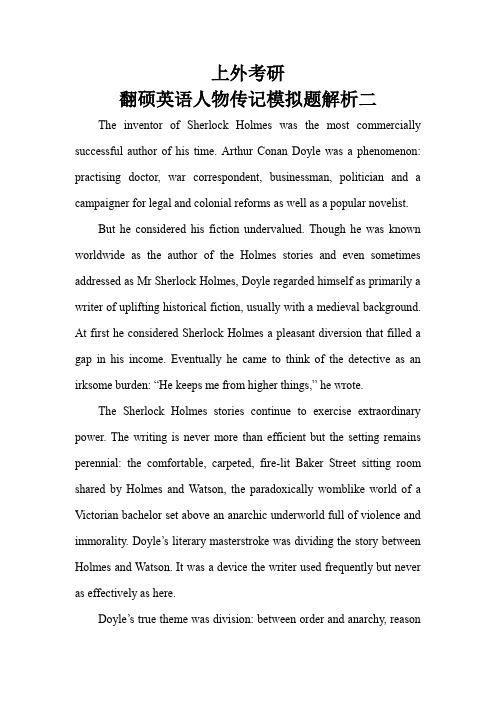
上外考研翻硕英语人物传记模拟题解析二The inventor of Sherlock Holmes was the most commercially successful author of his time. Arthur Conan Doyle was a phenomenon: practising doctor, war correspondent, businessman, politician and a campaigner for legal and colonial reforms as well as a popular novelist.But he considered his fiction undervalued. Though he was known worldwide as the author of the Holmes stories and even sometimes addressed as Mr Sherlock Holmes, Doyle regarded himself as primarily a writer of uplifting historical fiction, usually with a medieval background. At first he considered Sherlock Holmes a pleasant diversion that filled a gap in his income. Eventually he came to think of the detective as an irksome burden: “He keeps me from higher things,” he wrote.The Sherlock Holmes stories continue to exercise extraordinary power. The writing is never more than efficient but the setting remains perennial: the comfortable, carpeted, fire-lit Baker Street sitting room shared by Holmes and Watson, the paradoxically womblike world of a Victorian bachelor set above an anarchic underworld full of violence and immorality. Doyle’s literary masterstroke was dividing the story between Holmes and Watson. It was a device the writer used frequently but never as effectively as here.Doyle’s true theme was division: between order and anarchy, reasonand emotion, the material and the spiritual. He himself was a man divided, as two new biographical books make clear. The very picture of an upright Victorian gentleman, Doyle was not averse to fighting in the street when the mood took him. And in his late 30s, at the height of his fame, he ran a double life, conducting a largely secret affair with the woman who eventually became his second wife, while his first was gradually succumbing to tuberculosis.Much of this is revealed in detail in Andrew Lycett’s biography and in a selection of Doyle’s letters edited by the present executor of the Doyle estate. The story behind the publication of these two books might make a Doylesque thriller in itself. Mr Lycett and the Doyle estate vied to gain control of newly discovered material, each trying to get to market first. Mr Lycett’s book is a serious piece of work from an experienced professional biographer. If he never quite gets fully to grips with Doyle’s elusive personality, the author is particularly good on the intellectual background to Doyle’s work, both known and forgotten. The biography is hobbled by the Doyle estate’s refusal to permit quotation from numerous documents. But Mr Lycett makes the best of what he has and fills the gaps with insight.The selected letters by contrast are strictly an enthusiast’s book. The editors’ comments are a bit haphazard and it is poorly presented. On the other hand, it does convey an almost physical presence of the author, withhis strange mixture of kindness and carelessness, overbearing self-confidence and depressive self-doubt. Above all there is the impression of a man driven by internal forces. Since boyhood Doyle had been struggling with the consequences of his rationalist rejection of Catholicism and his growing conviction that there must be some kind of reality beyond the scientific. This was a division that in the end he could not manage. By the close of his life he was spending his diminishing energies defending not only the world of spiritualism but also the outermost fraudulent fringes of supernatural belief. It was a sorry ending.1. Conan Doyle regarded Holmes as a burden because_____[A] he considered his fiction was of high level but was generally undervalued.[B] he wrote the Holmes stories at the beginning for fun but later merely for the large income.[C] the Holmes stories hindered him from writing historical fiction.[D] the Holmes stories earned him the international fame as well as pressure.2. The word “averse” (Line 4, Paragraph 4) most probably means_____[A] adverse.[B] against.[C] opposite.[D] converse.3. In Andrew Lycett’s biography, Doyle is most probably described as_____[A] a reasonable gentleman.[B] a man with doubtful life style.[C] one with man divided psychological identities.[D] a man of integrity and enthusiasm.4. Doyle’s divided personality was a result of _____[A] his own creation of the two opposite characters, Holmes and Watson.[B] his paradoxical views on religion and science in boyhood.[C] his confusion on reality and fiction all through his life driven by internal forces.[D] his devotion to the world of spiritualism and his involvement in the secular society.5. Doyle estate refused to permit Mr. Lycett to quotate from documents because_____[A] He was concerned with the protection of Doyle’s privacy.[B] Mr. Lycett was not the ideal biographer of Doyle.[C] there was a kind of competition between the two parties in the publication of Doyle’s biog raphy.[D] He was unsatisfied with Mr. Lycett’s work which turns Doyle’s life into a thriller story.文章剖析:这篇文章介绍福尔摩斯故事集作者Doyle的一些情况。
上外考研英专汉译英名言名语翻译分享

上外考研英专英译汉名言名语翻译分享Learn to walk before you run.循序渐进。
Knowing something of everything, and everything of something. 通百艺而专一长。
From words to deeds is a great space.言行之间,大有距离。
Skill and confidence are an unconquered army.技能和信心是无敌的军队。
Habit is a second nature.习惯成自然。
Lifeless, faultless.只有死人才不会犯错误。
A book is the same today as it always was and it will never change. 好书千载常如新。
Books, like friends, should be few and well chosen.读书如择友,宜少且宜精。
A book that remains shut is but a block.书本不常翻,犹如一块砖。
It's not the gay coat that makes the gentleman.君子在德不在衣。
Two heads are better than one.三个臭皮匠顶个诸葛亮。
Birth is much, but breeding is more.出身重要,教养更重要。
Nothing is impossible to a willing mind.世上无难事,只怕有心人。
You can't make something out of nothing.巧妇难为无米之炊。
Nothing venture, nothing have.不入虎穴,焉得虎子。
Nothing for nothing.不费力气,一无所得。
Of nothing comes nothing.无中不能生有。
上外考研翻译硕士英语模拟题一详解
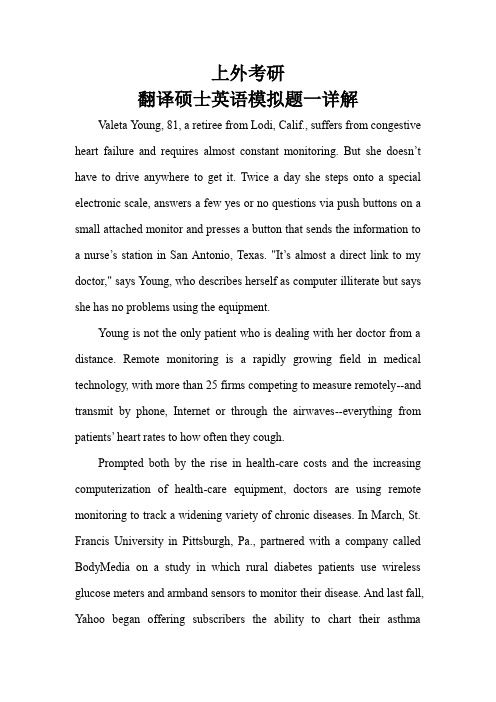
上外考研翻译硕士英语模拟题一详解Valeta Young, 81, a retiree from Lodi, Calif., suffers from congestive heart failure and requires almost constant monitoring. But she doesn’t have to drive anywhere to get it. Twice a day she steps onto a special electronic scale, answers a few yes or no questions via push buttons on a small attached monitor and presses a button that sends the information to a nurse’s station in San Antonio, Texas. "It’s almost a direct link to my doctor," says Young, who describes herself as computer illiterate but says she has no problems using the equipment.Young is not the only patient who is dealing with her doctor from a distance. Remote monitoring is a rapidly growing field in medical technology, with more than 25 firms competing to measure remotely--and transmit by phone, Internet or through the airwaves--everything from patients’ heart rates to how often they cough.Prompted both by the rise in health-care costs and the increasing computerization of health-care equipment, doctors are using remote monitoring to track a widening variety of chronic diseases. In March, St. Francis University in Pittsburgh, Pa., partnered with a company called BodyMedia on a study in which rural diabetes patients use wireless glucose meters and armband sensors to monitor their disease. And last fall, Yahoo began offering subscribers the ability to chart their asthmaconditions online, using a PDA-size respiratory monitor that measures lung functions in real time and e-mails the data directly to doctors.Such home monitoring, says Dr. George Dailey, a physician at the Scripps Clinic in San Diego, "could someday replace less productive ways that patients track changes in their heart rate, blood sugar, lipid levels, kidney functions and even vision."Dr. Timothy Moore, executive vice president of Alere Medical, which produces the smart scales that Young and more than 10,000 other patients are using, says that almost any vital sign could, in theory, be monitored from home. But, he warns, that might not always make good medical sense. He advises against performing electrocardiograms remotely, for example, and although he acknowledges that remote monitoring of blood-sugar levels and diabetic ulcers on the skin may have real value, he points out that there are no truly independent studies that establish the value of home testing for diabetes or asthma.Such studies are needed because the technology is still in its infancy and medical experts are divided about its value. But on one thing they all agree: you should never rely on any remote testing system without clearing it with your doctor.1. How does Young monitor her health conditions?[A] By stepping on an electronic scale.[B] By answering a few yes or no questions.[C] By using remote monitoring service.[D] By establishing a direct link to her doctor.2. Which of the following is not used in remote monitoring?[A] car[B] telephone[C] Internet[D] the airwaves3. The word “prompted” (Line 1, Paragraph 3) most probably means________.[A] made[B] reminded[C] aroused[D] driven4. Why is Dr. Timothy Moore against performing electrocardiogramsremotely?[A] Because it is a less productive way of monitoring.[B] Because it doesn’t make good medical sense.[C] Because it’s value has not been proved by scientific study[D] Because it is not allowed by doctors5. Which of the following is true according to the text?[A] Computer illiterate is advised not to use remote monitoring.[B] The development of remote monitoring market is rather sluggish.[C] Remote monitoring is mainly used to track chronic diseases.[D] Medical experts agree on the value of remote monitoring.答案:CADBC篇章剖析本文是一篇说明文,介绍了远程监护目前的发展状况,它的优势,相反的意见等。
上海外国语大学翻译硕士考研真题解析
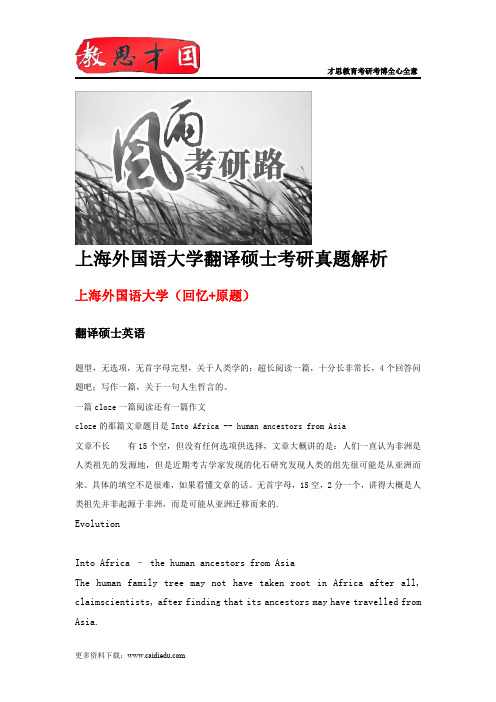
上海外国语大学翻译硕士考研真题解析上海外国语大学(回忆+原题)翻译硕士英语题型,无选项,无首字母完型,关于人类学的;超长阅读一篇,十分长非常长,4个回答问题吧;写作一篇,关于一句人生哲言的。
一篇cloze一篇阅读还有一篇作文cloze的那篇文章题目是Into Africa--human ancestors from Asia文章不长有15个空,但没有任何选项供选择,文章大概讲的是:人们一直认为非洲是人类祖先的发源地,但是近期考古学家发现的化石研究发现人类的组先很可能是从亚洲而来。
具体的填空不是很难,如果看懂文章的话。
无首字母,15空,2分一个,讲得大概是人类祖先并非起源于非洲,而是可能从亚洲迁移而来的.EvolutionInto Africa–the human ancestors from AsiaThe human family tree may not have taken root in Africa after all, claimscientists,after finding that its ancestors may have travelled fromAsia.By Richard Alleyne,Science Correspondent7:00PM BST27Oct2010While it is widelyaccepted that man evolved in Africa,in fact its immediate predecessors mayhave1colonised thecontinent after developing elsewhere,the study says.The claims are madeafter a team2unearthedthe fossils of anthropoids–the primate group that includes humans,apes andmonkeys–in Libya's Dur At-Talah.Paleontologistsfound that3amongstthe39million year old fossils there were three distinct families ofanthropoid primates,all of whom lived in the4area at approximately the same time.Few or anyanthropoids are known to have existed in Africa during this 5period,known as theEocene epoch.This could eithersuggest a huge gap in Africa's fossil record–6unlikely, say the scientists,given the amount ofarchaeological work undertaken in the area–7or that the species"colonised"Africafrom another continent at this time.As the evolutioninto three species would have8taken extreme lengths of time,combined with the lack of fossilrecords in Africa,the team concludes that Asia was the most likely9origin.Writing in thejournal Nature,the experts said they believed migration from Asia to be themost10plausibletheory.Christopher Beard,of the Carnegie Museum of Natural History in Pittsburgh, said:"11If our ideas are correct,this early colonisation of Africa by anthropoids was a truly12pivotal event—one ofthe key points in our evolutionary history."At the time,Africa was an island continent;when these13anthropoids appeared,there was nothing on thatisland that could compete with them. "It led to aperiod of flourishing evolutionary divergence amongstanthropoids,and one ofthose lineages14resultedin humans."If our earlyanthropoid ancestors had not succeeded in migrating from Asia to Africa,wesimply15wouldn'texist."He added:"This extraordinary new fossil site in Libya shows us that in the middleEocene,39million years ago,there was a surprising diversity of anthropoidsliving in Africa,whereas few if any anthropoids are known from Africa beforethis time."This suddenappearance of such diversity suggests that these anthropoids probably colonisedAfrica from somewhere else."Withoutearlier fossil evidence in Africa,we're currently looking to Asia as the placewhere these animals first evolved."阅读。
上外考研翻译基础英语长难句翻译整理分享
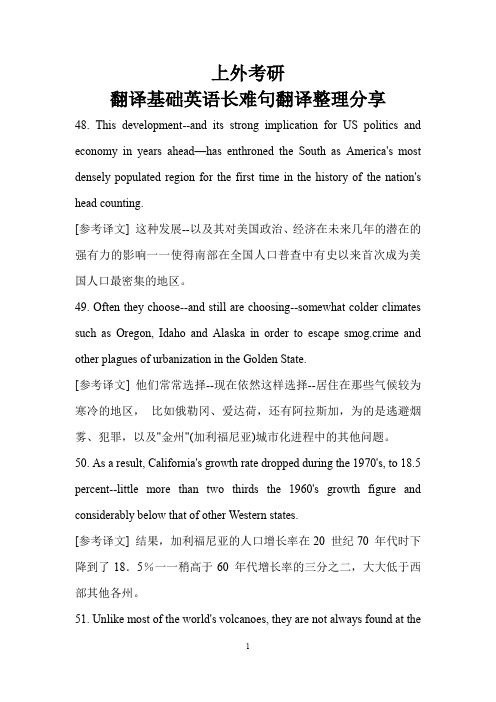
上外考研翻译基础英语长难句翻译整理分享48. This development--and its strong implication for US politics and economy in years ahead—has enthroned the South as America's most densely populated region for the first time in the history of the nation's head counting.[参考译文] 这种发展--以及其对美国政治、经济在未来几年的潜在的强有力的影响一一使得南部在全国人口普查中有史以来首次成为美国人口最密集的地区。
49. Often they choose--and still are choosing--somewhat colder climates such as Oregon, Idaho and Alaska in order to escape smog.crime and other plagues of urbanization in the Golden State.[参考译文] 他们常常选择--现在依然这样选择--居住在那些气候较为寒冷的地区,比如俄勒冈、爱达荷,还有阿拉斯加,为的是逃避烟雾、犯罪,以及"金州"(加利福尼亚)城市化进程中的其他问题。
50. As a result, California's growth rate dropped during the 1970's, to 18.5 percent--little more than two thirds the 1960's growth figure and considerably below that of other Western states.[参考译文] 结果,加利福尼亚的人口增长率在20 世纪70 年代时下降到了18.5%一一稍高于60 年代增长率的三分之二,大大低于西部其他各州。
上外考研翻硕英语阅读理解经济类题材模拟分享
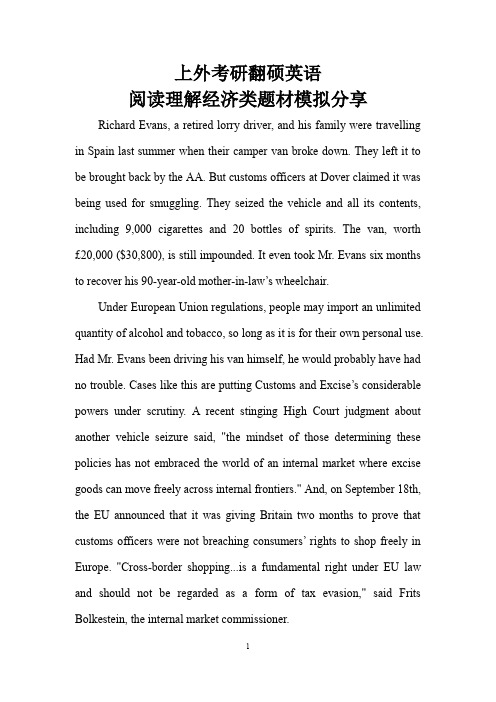
上外考研翻硕英语阅读理解经济类题材模拟分享Richard Evans, a retired lorry driver, and his family were travelling in Spain last summer when their camper van broke down. They left it to be brought back by the AA. But customs officers at Dover claimed it was being used for smuggling. They seized the vehicle and all its contents, including 9,000 cigarettes and 20 bottles of spirits. The van, worth £20,000 ($30,800), is still impounded. It even took Mr. Evans six months to recover his 90-year-old mother-in-law’s wheelchair.Under European Union regulations, people may import an unlimited quantity of alcohol and tobacco, so long as it is for their own personal use. Had Mr. Evans been driving his van himself, he would probably have had no trouble. Cases like this are putting Customs a nd Excise’s considerable powers under scrutiny. A recent stinging High Court judgment about another vehicle seizure said, "the mindset of those determining these policies has not embraced the world of an internal market where excise goods can move freely across internal frontiers." And, on September 18th, the EU announced that it was giving Britain two months to prove that customs officers were not breaching consumers’ rights to shop freely in Europe. "Cross-border shopping...is a fundamental right under EU law and should not be regarded as a form of tax evasion," said Frits Bolkestein, the internal market commissioner.Customs officers have an impossible job. Excise duty and V AT on a pack of premium brand cigarettes account for 79% of the recommended retail selling price of £4.51. An identical pack costs £1.97 in Belgium. One in every five cigarettes smoked in Britain--some 17 billion altogether--has been smuggled. The Tobacco Manufacturers’ Association reckons that 80% of hand-rolling tobacco is smuggled.The main weapon Customs and Excise has in tackling abuse is to seize cars in which it suspects goods are being smuggled. Guidelines suggest "personal use" can mean only up to 800 cigarettes, for example. Anyone bringing in more can be asked to explain. In the past three years, customs officers have impounded more than 22,000 vehicles. Tellingly, only a fifth of seizures are contested, and fewer than 1% of appeals are successful. Officials say the value of cross-channel smuggling has fallen sharply in the past year, from £1.6 billion to £400m.Some customs officers, though, have clearly been over-zealous. And the recent High Court case ruled that the legislation under which Customs and Excise operates wrongly reverses the burden of proof. The defendant must prove that he is not bringing in tobacco and so forth for a commercial purpose. It also said that customs officers must have "reasonable grounds" for searches: suspicion and instinct are not enough. The government is appealing.The minister in charge of Customs and Excise, John Healey, acceptsthat there is an urgent need to respond to questions about the "legitimacy" of the Customs regime. But he says the charge that Customs are abusing their powers is wrong: "Customs," he says, "never stop at random, they never do blanket searches. They always have some ground for stopping people." Tell that to Mr Evans.1. How could Richard Evans have avoided such a trouble?[A]If the camper van didn’t break down on the way.[B]If the amount of alcohol and tobacco were not too large.[C]If he carried cigarettes and spirits for personal use.[D]If he hadn’t asked others to drive the car.2. How does the EU feel about the behavior of Customs and Excise?[A]Critical.[B]Optimistic.[C]Indifferent.[D]Supportive.3. How can Customs and Excise check the smuggling effectively?[A]By doing blanket searches.[B]By seizing the suspect cars.[C]By limiting shopping in Europe.[D]By stopping at random.4. What is the charge against Customs and Excise?[A]They are abusing their power.[B]They deprive Europeans of their right to a free shop.[C]They seize the car for no good reason.[D]Their power is too excessive.5. By “Tell that to Mr Evans.”(Last Line, Paragraph 6), the authormeans _____________.[A]Evans should learn a lesson from his experience[B]what John Healey has said is good for Evans[C]he does not believe what John Healey has said[D]Evans should understand what he has experienced答案:DABAC篇章剖析本文采用提出问题—分析问题的模式,非常客观地分析了海关工作确实是一件非常棘手,但也确实非常必要的工作,但在工作中有些官员表现得过于“热情”,有滥用职权的嫌疑,所以招致了一些公民的指控。
上海外国语大学 考研备考 英语英汉互译训练题九

上海外国语大学考研备考英汉互译训练题九T上外英语MTI和英语语言文学考研试题中翻译是必考题型,大家平时要勤加练习,充分诠释信雅达的翻译要求。
英汉互译是考试的难点,今天再来训练一下英汉互译。
题一Andit was the same with phrases. She would drag home a whole phrase, if it had agrand sound, and play it six nights and two matinees, and explain it in a newway every time—which she had to, for all shec ared for was the phrase; shewasn’t interested in what it meant, and knew those dogs hadn’t wit enough tocatch her, anyway. Yes, she was a daisy! She got so she wasn’t afraid ofanything, she had such confidence in the ignorance of those creatures.She evenbrought anecdotes that she had heard the family and the dinner-guests laugh andshout over; and as a rule she got the nub of one chestnut hitched onto anotherchestnut, where, of course, it didn’t fit and hadn’t any point; and when shedelivered the nub she f ell over and rolled on the floor and laughed and barkedin the most insane way, while I could see that she was wondering to herself whyit didn’t seem as funny as it did when she first heard it. But no harm wasdone; the others rolled and barked too, privately ashamed of themselves for notseeing the point, and never suspecting that the fault was not with them andthere wasn’t any to see.翻译:对于短语也是这样。
上海外国语大学翻硕MTI—— 经验整理分享
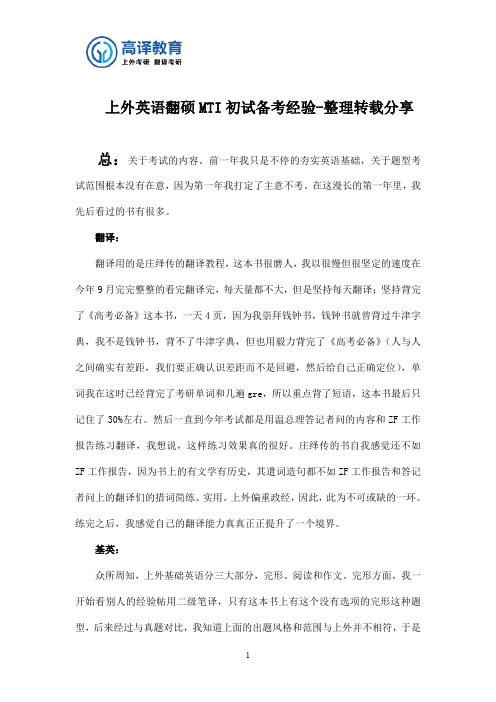
上外英语翻硕MTI初试备考经验-整理转载分享总:关于考试的内容。
前一年我只是不停的夯实英语基础,关于题型考试范围根本没有在意,因为第一年我打定了主意不考。
在这漫长的第一年里,我先后看过的书有很多。
翻译:翻译用的是庄绎传的翻译教程,这本书很磨人,我以很慢但很坚定的速度在今年9月完完整整的看完翻译完,每天量都不大,但是坚持每天翻译;坚持背完了《高考必备》这本书,一天4页,因为我崇拜钱钟书,钱钟书就曾背过牛津字典,我不是钱钟书,背不了牛津字典,但也用毅力背完了《高考必备》(人与人之间确实有差距,我们要正确认识差距而不是回避,然后给自己正确定位),单词我在这时已经背完了考研单词和几遍gre,所以重点背了短语,这本书最后只记住了30%左右。
然后一直到今年考试都是用温总理答记者问的内容和ZF工作报告练习翻译,我想说,这样练习效果真的很好。
庄绎传的书自我感觉还不如ZF工作报告,因为书上的有文学有历史,其遣词造句都不如ZF工作报告和答记者问上的翻译们的措词简练、实用。
上外偏重政经,因此,此为不可或缺的一环。
练完之后,我感觉自己的翻译能力真真正正提升了一个境界。
基英:众所周知,上外基础英语分三大部分,完形、阅读和作文。
完形方面,我一开始看别人的经验帖用二级笔译,只有这本书上有这个没有选项的完形这种题型,后来经过与真题对比,我知道上面的出题风格和范围与上外并不相符,于是辗转买到一个上外毕业从事教育培训的出的模拟题,我买了翻硕英语和翻译基础一共12套题,考试之前认认真真的练习,每次做完完形跟阅读我都把文章里的每一个语言点弄明白。
从一开始错误很多,到后来逐渐改善,我感觉到自己的实力真的在慢慢提升,虽然不知道能不能考上,因为对没有接触过上外的我而言,一切都是那么不真实,我不清楚上外的实力和难度。
但是我感到心安理得,我努力过,虽然出来的结果并不好,但也不后悔。
在这个过程中,很是消磨人的意志。
可能有的人一开始做题就顺风顺水,错误甚少;可是我并不是这样的人,从开始就错误百出,可以想象,一个完形里15个空,8、9个错误是多么得让人不愿去接受,可是我很坚毅,一直坚持了下来,到最后将错误控制在5个以内了,不论是做二级题还是模拟题亦或真题;这一点跟最初背诵GRE单词相似,可以想象,10个单词里面9个不认识,还要每天坚持背诵是多么让人崩溃,可是我就是因为知道自己没有资质,所以才痛下苦功,坚持背了1年半,7、8遍。
(NEW)上海外国语大学高级翻译学院《841翻译实践(英汉互译)》历年考研真题及详解

目 录2009年上海外国语大学高级翻译学院841翻译实践(英汉互译)考研真题及详解2006年上海外国语大学高级翻译学院841翻译实践(英汉互译)考研真题及详解2009年上海外国语大学高级翻译学院841翻译实践(英汉互译)考研真题及详解I. Translate the following into Chinese(75分)The Short MarchBy BILL POWELL/SHANGHAI Thursday, Feb. 14, 2008Locals sell produce outside the gates of one of Songjiang’s new developmentsOn a cold, gray afternoon a year ago, I stood on the deck of our newly purchased, half-constructed house about an hour outside Shanghai, wondering what, exactly, I had gotten myself into. My wife, a Shanghai native, and I had moved back to China from New York City in the spring of 2004, and 21/2 years later we had decided to take the plunge. We bought a three-story, five-bedroom townhouse way out in the suburbs, in a town called New Songjiang, a place that was then—and remains now—very much a work in progress.We had come here that day to see how construction was progressing. Our house, along with about 140 others, was going up in a development called Emerald Riverside. It sits on the banks of a tributary that dumps into the Huangpu, the river that cuts Shanghai in two about 28 miles (45 km) to the northeast. On that dreary afternoon I gazed out to the other side of the river, looking at the only significant patch of land for miles that was not yet being developed—about five acres (20,000 sq. m) of green that local farmers still used to grow watermelons, which they then sold to the migrant workers building this town. On the far bank there was a ramshackle one-room brick house, where three of the farmers lived—a husband, wife and teenage son. They had no running water—they bathed and washed their clothes in the river—and the place was lit by a single bulb. In every direction just beyond the watermelon patch, office parks and houses and apartment complexes were going up, forming a cordon around the farmland that was drawing inexorably tighter. As it is in vast swathes of China, the new was replacing the old, and it was not doing so slowly. It was doing so in the blink of an eye.I stood on the deck that day and watched one of the farmers who worked the watermelon patch, an older woman who would later introduce herself to us as Liu Yi, as she stared back at me across the river. I remember thinking to myself, My god, what must be going through her mind? Not only is the land she works on about to disappear, but there’s this foreigner standing over there staring at her. Where did he come from and, more to the point, what in the world is he doing out here? The short answer is that my wife and I have become a tiny part of China’s latest revolution. We got an off-the-shelf mortgage from the Standard Chartered Bank branch in town, plunked down 25% of the purchase price, and bought ourselves a piece of the Great Chinese Dream.Best Years of Their LivesFor the past decade and a half, the frantic pace of urbanization has been the transformative engine driving this country’s economy, as some 300-400 million people from dirt-poor farming regions made their way to relative prosperity in cities. Within the contours of that great migration, however, there is another one now about to take place—less visible, but arguably no less powerful. As China’s major cities—there are now 49 with populations of one million or more, compared with nine in the U.S. in 2000—become more crowded and more expensive, a phenomenon similar to the one that reshaped the U.S. in the aftermath of World War II has begun to take hold. That is the inevitable desire among a rapidly expanding middle class for a little bit more room to live, at a reasonable price; maybe a little patch of grass for children to play on, or a whiff of cleaner air as the country’s cities become ever more polluted.This is China’s Short March. A wave of those who are newly affluent and firm in the belief that their best days, economically speaking, are ahead of them, is headed for the suburbs. In Shanghai alone, urban planners believe some 5 million people will move to what are called “satellite cities” in the next 10 years. To varying degrees, the same thing is happening all across China. This process—China’s own suburban flight—is at the core of the next phase of this country’s development, and will be for years to come.The consequences of this suburbanization are enormous. Think of how the U.S. was transformed, economically and socially, in the years after World。
上海外国语大学考研英语语言文学英汉互译词法翻译专项总结分享
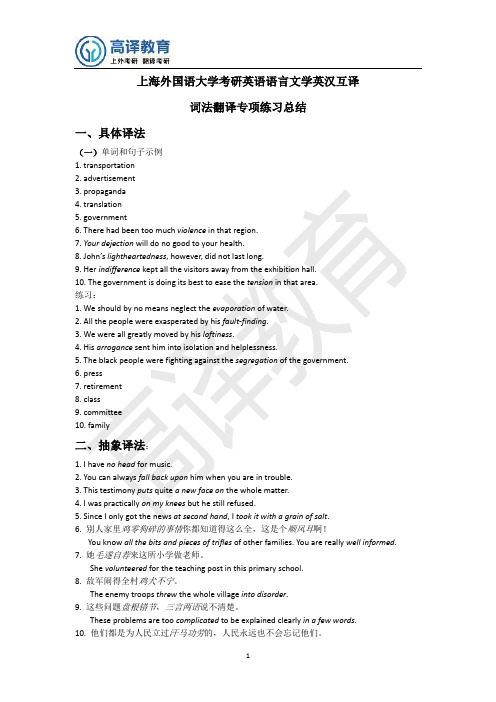
上海外国语大学考研英语语言文学英汉互译词法翻译专项练习总结一、具体译法(一)单词和句子示例1. transportation2. advertisement3. propaganda4. translation5. government6. There had been too much violence in that region.7. Your dejection will do no good to your health.8. John’s lightheartedness, however, did not last long.9. Her indifference kept all the visitors away from the exhibition hall.10. The government is doing its best to ease the tension in that area.练习:1. We should by no means neglect the evaporation of water.2. All the people were exasperated by his fault-finding.3. We were all greatly moved by his loftiness.4. His arrogance sent him into isolation and helplessness.5. The black people were fighting against the segregation of the government.6. press7. retirement8. class9. committee10. family二、抽象译法:1. I have no head for music.2. You can always fall back upon him when you are in trouble.3. This testimony puts quite a new face on the whole matter.4. I was practically on my knees but he still refused.5. Since I only got the news at second hand, I took it with a grain of salt.6. 别人家里鸡零狗碎的事情你都知道得这么全,这是个顺风耳啊!You know all the bits and pieces of trifles of other families. You are really well informed.7. 她毛遂自荐来这所小学做老师。
上海外国语大学2009英语翻译试题精析_附丁雪明完型讲义
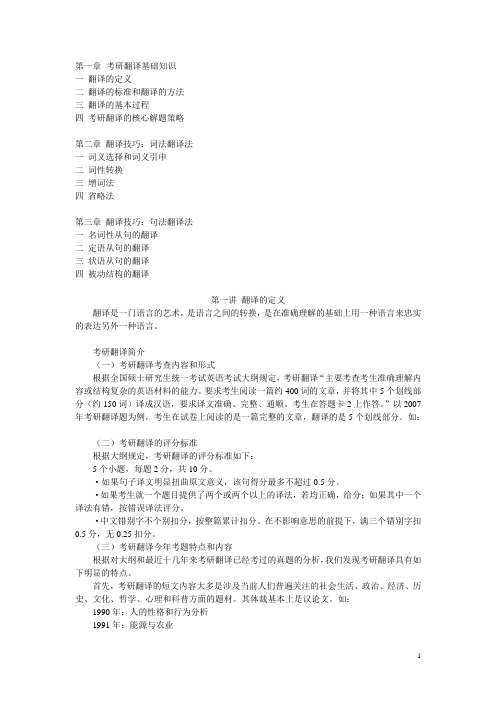
第一章考研翻译基础知识一翻译的定义二翻译的标准和翻译的方法三翻译的基本过程四考研翻译的核心解题策略第二章翻译技巧:词法翻译法一词义选择和词义引申二词性转换三增词法四省略法第三章翻译技巧:句法翻译法一名词性从句的翻译二定语从句的翻译三状语从句的翻译四被动结构的翻译第一讲翻译的定义翻译是一门语言的艺术,是语言之间的转换,是在准确理解的基础上用一种语言来忠实的表达另外一种语言。
考研翻译简介(一)考研翻译考查内容和形式根据全国硕士研究生统一考试英语考试大纲规定,考研翻译“主要考查考生准确理解内容或结构复杂的英语材料的能力。
要求考生阅读一篇约400词的文章,并将其中5个划线部分(约150词)译成汉语,要求译文准确、完整、通顺。
考生在答题卡2上作答。
”以2007年考研翻译题为例,考生在试卷上阅读的是一篇完整的文章,翻译的是5个划线部分。
如:(二)考研翻译的评分标准根据大纲规定,考研翻译的评分标准如下:5个小题,每题2分,共10分。
·如果句子译文明显扭曲原文意义,该句得分最多不超过0.5分。
·如果考生就一个题目提供了两个或两个以上的译法,若均正确,给分;如果其中一个译法有错,按错误译法评分。
·中文错别字不个别扣分,按整篇累计扣分。
在不影响意思的前提下,满三个错别字扣0.5分,无0.25扣分。
(三)考研翻译今年考题特点和内容根据对大纲和最近十几年来考研翻译已经考过的真题的分析,我们发现考研翻译具有如下明显的特点。
首先,考研翻译的短文内容大多是涉及当前人们普遍关注的社会生活、政治、经济、历史、文化、哲学、心理和科普方面的题材。
其体裁基本上是议论文。
如:1990年:人的性格和行为分析1991年:能源与农业1992年:智力评估的科学性1993年:科学研究的方法1994年:科学家、技术与科学发展的关系1995年:标准化测试与评估1996年:科学发展的差别和动力1997年:动物的权利1998年:天体物理学中的大爆炸理论1999年:历史研究的方法论2000年:政府调控与工业化发展2001年:计算机与未来生活2002年:行为科学的发展2003年:人类学的发展2004年:语言学2005年:传媒领域中的电视媒介2006年:美国知识分子的作用2007年:法学在新闻报道中的作用。
上海外国语大学英语翻硕考研备考-译文赏析
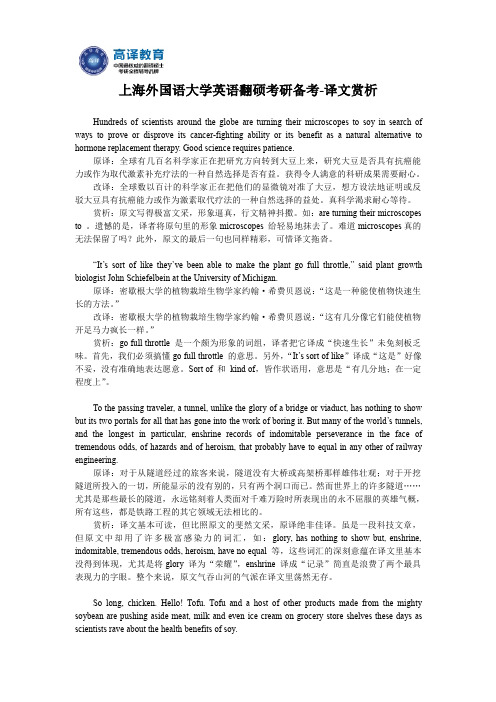
上海外国语大学英语翻硕考研备考-译文赏析Hundreds of scientists around the globe are turning their microscopes to soy in search of ways to prove or disprove its cancer-fighting ability or its benefit as a natural alternative to hormone replacement therapy.Good science requires patience.原译:全球有几百名科学家正在把研究方向转到大豆上来,研究大豆是否具有抗癌能力或作为取代激素补充疗法的一种自然选择是否有益。
获得令人满意的科研成果需要耐心。
改译:全球数以百计的科学家正在把他们的显微镜对准了大豆,想方设法地证明或反驳大豆具有抗癌能力或作为激素取代疗法的一种自然选择的益处。
真科学渴求耐心等待。
赏析:原文写得极富文采,形象逼真,行文精神抖擞。
如:are turning their microscopes to。
遗憾的是,译者将原句里的形象microscopes给轻易地抹去了。
难道microscopes真的无法保留了吗?此外,原文的最后一句也同样精彩,可惜译文拖沓。
“It’s sort of like they’ve been able to make the plant go full throttle,”said plant growth biologist John Schiefelbein at the University of Michigan.原译:密歇根大学的植物栽培生物学家约翰·希费贝恩说:“这是一种能使植物快速生长的方法。
”改译:密歇根大学的植物栽培生物学家约翰·希费贝恩说:“这有几分像它们能使植物开足马力疯长一样。
”赏析:go full throttle是一个颇为形象的词组,译者把它译成“快速生长”未免刻板乏味。
上海外国语大学《641翻译实践》英汉互译考研真题

上海外国语大学《641翻译实践》英汉互译考研真题上海外国语大学《641翻译实践》英汉互译考研真题一、上海外国语大学高级翻译学院841翻译实践(英汉互译)考研真题及详解I. Translate the following into Chinese(75分)The Short MarchBy BILL POWELL/SHANGHAI Thursday, Feb. 14, 2008 Locals sell produce outside the gates of one of Songjiang’s new developmentsOn a cold, gray afternoon a year ago, I stood on the deck of our newly purchased, half-constructed house about an hour outside Shanghai, wondering what, exactly, I had gotten myself into. My wife, a Shanghai native, and I had moved back to China from New York City in the spring of 2004, and 21/2 years later we had decided to take the plunge. We bought a three-story, five-bedroom townhouse way out in the suburbs, in a town called New Songjiang, a place that was then—and remains now —very much a work in progress.We had come here that day to see how construction was progressing. Our house, along with about 140 others, was going up in a development called Emerald Riverside. It sits on the banks of a tributary that dumps into the Huangpu, the river that cuts Shanghai in two about 28 miles (45km) to the northeast. On that dreary afternoon I gazed out to the other side of the river, looking at the only significant patch of land for miles that was not yet being developed—about five acres (20,000 sq. m) of green that local farmers still used to grow watermelons, which they then sold to the migrant workersbuilding this town. On the far bank there was a ramshackle one-room brick house, where three of the farmers lived—a husband, wife and teenage son. They had no running water—they bathed and washed their clothes in the river—and the place was lit by a single bulb. In every direction just beyond the watermelon patch, office parks and houses and apartment complexes were going up, forming a cordon around the farmland that was drawing inexorably tighter. As it is in vast swathes of China, the new was replacing the old, and it was not doing so slowly. It was doing so in the blink of an eye.I stood on the deck that day and watched one of the farmers who worked the watermelon patch, an older woman who would later introduce herself to us as Liu Yi, as she stared back at me across the river.I remember thinking to myself, My god, what must be going through her mind? Not only is the land she works on about to disappear, but there’s this foreigner standing over there staring at her. Where did he come from and, more to the point, what in the world is he doing out here? The short answer is that my wife and I have become a tiny part of China’s latest revolution. We got an off-the-shelf mortgage from the StandardChartered Bank branch in town, plunked down 25% of the purchase price, and bought ourselves a piece of the Great Chinese Dream.Best Years of Their LivesFor the past decade and a half, the frantic pace of urbanization has been the transformative engine driving this country’s economy, as some 300-400 million people from dirt-poor farming regions made their way to relative prosperity in cities. Within the contours of that great migration, however, thereis another one now about to take place—less visible, but arguably no less powerful. As China’s major cities—there are now 49 with populations of one million or more, compared with nine in the U.S. in 2000—become more crowded and more expensive, a phenomenon similar to the one that reshaped the U.S. in the aftermath of World War II has begun to take hold. That is the inevitable desire among a rapidly expanding middle class for a little bit more room to live, at a reasonable price; maybe a little patch of grass for children to play on, or a whiff of cleaner air as the country’s cities become ever more polluted.This is China’s Short March. A wave of those who are newly affluent and firm in the belief that their best days, economically speaking, are ahead of them, is headed for the suburbs. In Shanghai alone, urban planners believe some 5 million people will move to what are called “satellite cities”in the next 10 years. To varying degrees, the same thing ishappening all across China. This process—China’s own suburban flight —is at the core of the next phase of this country’s development, and will be for years to come.The consequences of this suburbanization are enormous. Think of how the U.S. was transformed, economically and socially, in the years after World War II, when GIs returned home and formed families that then fanned out to the suburbs. The comparison is not exact, of course, but it’s compelling enough. The effects of China’s suburbanization are just beginning to ripple across Chinese society and the global economy. It’s easy to understand the persistent strength in commodity prices—steel, copper, lumber, oil—when you realize that in Emerald Riverside construction crews used more than three tons of steel in the houses and nearly a quarter of a ton of copper wiring.There are 35 housing developments either just finished or still under construction in New Songjiang alone, a town in which 500,000 people will eventually live. And as Lu Hongjiang, a vice president of the New Songjiang Development & Construction company puts it, “we’re only at the very beginning of this in China.”【参考译文】短行军比尔·鲍威尔,星期四,2008年2月14日当地人在新淞江发展区门外卖农产品一年前的一个寒冷阴暗的下午,我站在我们距离上海市区一小时车程的尚在建设中的新房的地板上,陷入了沉思,我的妻子是上海本地人,我在2004年春天离开纽约来到中国,两年半以后我们做了这个决定。
- 1、下载文档前请自行甄别文档内容的完整性,平台不提供额外的编辑、内容补充、找答案等附加服务。
- 2、"仅部分预览"的文档,不可在线预览部分如存在完整性等问题,可反馈申请退款(可完整预览的文档不适用该条件!)。
- 3、如文档侵犯您的权益,请联系客服反馈,我们会尽快为您处理(人工客服工作时间:9:00-18:30)。
上海外国语大学英语翻硕考研备考-译文赏析
Wherever you are,and whoever you may be,there is one thing in which you and I are just alike at this moment,and in all the moments of our existence.We are not at rest;we are on a journey. Our life is a moment,a tendency,a steady,ceaseless progress towards an unseen goal.We are gaining something,or losing something,everyday.Even when our position and our character seem to remain precisely the same,they are changing.For the mere advance of time is a change.It is not the same thing to have a bare field in January and in July.The season makes the difference.The limitations that are childlike in the child are childish in the man.
译文:无论你是谁,无你身处何方,此时此刻,你我有一个共同点,一个永远伴随你我的共同点。
那就是,我们并不安闲,我们都身在旅途。
我们的人生是一场运动,一个趋势,一段坚定不移、无止无休地朝一个未知目标努力的过程。
每天,我们都有所得,也有所失。
即使我们的位置和品行看似与原来无异,但它们实际正在改变。
时间的推移本身就是一种改变。
一月和七月的荒野是截然不同的,是季节造成了变化。
孩童的天真烂漫,便现在成人身上则成了幼稚。
点评:本段之末句,简直令我们作者文思如瀑!作者妙用了近义词childlike/childish。
人生如世界之过客,看似近似之人性,但是时过境迁,其性质发生了变化,和上句It is not the same thing to have a bare field in January and in July。
构成平行对比,发人深省,但是作者并没有依据上句“画瓢”,如写成:It is not the same thing to be childlike in the child and in the man。
Everything that we do is a step in one direction or another.Even the failure to do something is in itself a deed.It sets us forward or backward.The action of the negative pole of a magnetic needle is just as real as the action of the positive pole.To decline is to accept----the other alternative.
译文:我们所做的每件事都是朝某个方向迈出的一步。
就算是失败,其本质也是一项成就。
磁针负极的运动和其正极的运动同样真实。
拒绝即接受-----只是另一种选择罢了。
点评:Even the failure to do something is in itself a deed.It sets us forwards or backward。
一句简直是经典之句,充满哲理。
到本段之最后,这种哲理更是被推演到极致:
To decline is to accept----the other alternative.
Are you nearer to your port today than you were yesterday?Yes,---you must be a little nearer to some port or other;for since your ship was first launched upon the sea of life,you have never been still for a single moment;the sea is too deep,you could not find an anchorage if you would; there can be no pause until you come into port.
译文:相比昨天,今天你是否离港湾更近一些了呢?是的,------你一定离某个港湾更近了;因为,自从你驶入人生的海洋,你的航船便没有片刻停歇;海洋是如此深邃,你根本无法找到抛锚停泊之处;因此,在驶入港湾之前,你不得歇下脚步。
点评:这就是人生的最真实写照:……since your ship was first launched upon the sea of life, you have never been still for a single moment.。
